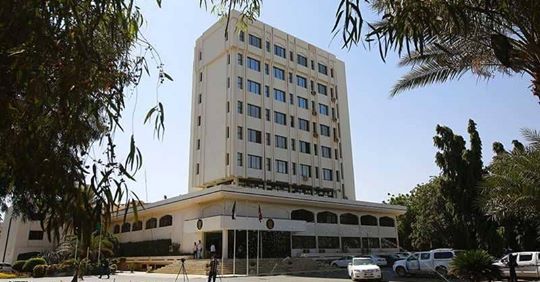What about reinstatement of sacked diplomats to Sudan’s foreign ministry?
October 14, 2022 (KHARTOUM) – Intense changes have occurred in the Sudanese Ministry of Foreign Affairs since October 25, 2021, the day when the Commander in Chief of the Armed Forces Gen Abdel-Fattah al-Burhan, overthrew the civilian government.
The Supreme Court, on January 23, 2022, issued a decision cancelling the decision 29/2020, regarding the termination of the service of about 104 ambassadors, diplomats and administrators at the Ministry of Foreign Affairs. The court reinstated actually dozens in new jobs within the ministry or the same positions they had occupied, while some were sent to Sudan’s embassies abroad.
Most of the relieved ambassadors served in the past as spokesmen for the foreign ministry such as Abu Bakr al-Siddiq, Khalid Musa, Youssif al-Kordafani, and Qareeb-Allah Khadir.
Among the reinstated diplomats are Amira Gurnas, the wife of the former Foreign Minister Ali Karti, Ahmed Youssif, Kamal Ismail, Yasir Khidir, Hassan Eissa, Alwalid Sayed, Muawiya Altoam, Abdel-Ghani al-Naeem, Al-Saddiq Abdalla, and others.
Abu-Bakr Al-Siddiq has been appointed as head of the Department of Sub-Regional Organizations, Khalid Musa as Director of the European Department, Gariballa Khidir as Director of the Southern Sudan Department, and Youssif Al-Kordafani as Director of the International Organizations Department. Abdel-Aziz Saleh serves as the head of the Department of Neighbouring Countries, and Omer Eissa was appointed as Director of the Arab Department.
The ministry’s leadership recently appointed some of the reinstated diplomats at the head of technical and administrative departments, according to sources in the ministry who spoke to Sudan Tribune.
The sources confirmed the appointment of several reinstated diplomats to different departments such as the Planning and Training, and the Technical and Administrative Departments. Three other ambassadors retired, including Mohi el-Din Salem, former ambassador to Addis Ababa and Kuwait.
Some of the reinstated diplomats were nominated to embassies abroad, including Awad al-Karim al-Rayah as ambassador to Kuwait, and Muawiya Altoam as Deputy Head of Sudan’s Permanent Mission to the United Nations in New York.
Why this quick reinstatement
On December 10, 2020, the Empowerment Removal Committee (ERC) sacked 30 ambassadors, and later on February 29, 2021, it further fired about 104 ambassadors, diplomats and administrators.
The then-acting ERC Chairman and a former Member of the Sovereign Council, Mohamed al-Faki, said that 14 ambassadors and two plenipotentiaries were appointed by presidential decisions, and the rest were appointed in line with the empowering policy of the Islamists without consideration to the rules and procedures of the civil service.
A source in the ministry, who requested anonymity, believes that the restoration of the sacked diplomats comes in the context of the “second empowerment” in the ministry “Al-Burhan coup” hastened their return of ambassadors, diplomats and administrators who are part of the former regime, he added.
Who manages the “Foreign Ministry” file?
Several sources confirmed to Sudan Tribune that Gen Shams al-Din Kabbashi, a Member of the Transitional Sovereign Council supervises the foreign affairs file.
The sources confirmed that Kabbashi oversaw the appointment of the reinstated ambassadors for a number of diplomatic missions abroad. He works directly with the Undersecretary, Ambassador Dafa’alla Al-Haj, on everything related to the internal organization of the ministry.
Mohamed al-Faki a former member of the Sovereign Council and the acting head of the suspended ERC confirmed to Sudan Tribune that all the decisions made after the coup, including the reinstatement of the fired diplomat, were a direct result of the coup.
The reinstatement of the dismissed diplomats “is a coup against the entire transitional period” and not an isolated decision., al Faki stresses.
Promotions:
The legal advisor of the committee of the diplomats dismissed by the ERC, lawyer and ambassador Siraj el-Din Hamid, told Sudan Tribune that preparations undergoing in the foreign ministry to promote some of the reinstated diplomats.
Hamid, also, said that his committee is working to get the payment of the financial arrears of salary for the reinstated diplomats, adding they are closely working with the Ministry of Foreign Affairs and the Ministry of Finance.
He pointed out that 137 diplomats and administrators have returned to work until the beginning of October 2022.
A high-ranking diplomat confirmed to Sudan Tribune that about 100 diplomats, administrators and ambassadors have resumed their activities in accordance with the decisions of the Supreme Court.
Illegal Decisions
Akram Hadra, a Sudanese lawyer, told the Sudan Tribune that all these decisions were issued without legal basis and do not have legal force.
According to Hadra, the Supreme Court is not competent because it has bypassed the normal appeals process.
“The Supreme Court cannot add cases to its docket before lower courts rule on them,” he said.
In addition, he said the ERC was absent when the court issued its decision while they had to hear its position and considerations before issuing a decision to reinstate the sacked Islamists.
Heading East
The first direct effect of the reinstatement of the diplomats of the al-Bashir regime is that they push to position the country in the pro-Russian and Chinese camps, as they used in the past with the isolated Islamist regime.
The foreign ministry during the civilian-led transitional government sought to open the country to the international community and mark the end of Sudan’s isolation.
The second consequence is that the foreign ministry may suffer from challenges and contradictory positions as a result of the internal struggle between the Islamists and pro-democracy diplomats who reintegrated the ministry during the Hamdok era. And there is a narrow scope for the ministry’s success in advancing an integrated work to manage Sudan’s relations.
(ST)

